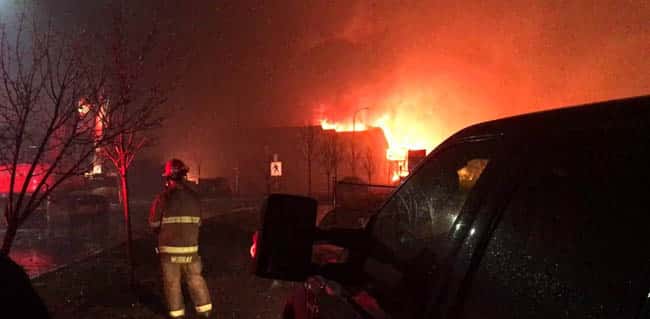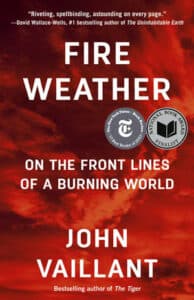
John Vaillant
FIRE WEATHER
On the Front Lines of a Burning World
Penguin Random House, 2023

I write this review in the immediate aftermath of Hurricane Milton’s devastation of parts of Florida. Milton followed Helene, just a week or so earlier. Both hurricanes cut a swathe through parts of North America, leaving death and destruction in their paths.
John Vaillant’s recent book Fire Weather is subtitled a “true story from a hotter world” and the story of hurricanes Milton and Helene could have shared that subtitle. They were both made worse by the hotter world we now live on. Scientists and environmentalists have longed warned about the feedback mechanisms of a warmer planet. As the world gets warmer, climate change further encourages the warming of the world. This cycle accelerates the speed of warming. The catastrophes that accompany a hotter planet come thicker and faster.
Fire Weather deals with just one such catastrophe, but it is an emblematic and enlightening one, the destruction of Fort McMurray in Alberta, Canada in 2016. There’s a grim feedback mechanism in play here, for McMurray is at the heart of fossil fuel capitalism. It was for many years a boomtown driven by the wealth of the region’s tar sands. The bitumen deposits here are difficult to turn into profitable commodities. But when the price of oil is high enough there are bonanzas to be made. McMurray was a town built on bonanza.
Vaillant traces the history of McMurray, and indeed, the history of industrial capitalism’s obsession with oil. Its a fascinating story that shows the way that capitalism embedded nature, and its resources, into a global commodity system. McMurray started off as an isolated place where animal skins and fur were trapped and sold, before morphing into an (isolated) 21st century oil city. Weaved in with this history is a longer story of humanity’s relationship with fire. Combustion, burning, fire are essential for humans. We need fire for travel, heating and food. But fire is also intrinsic to nature. The boreal forests that surround McMurray for tens of thousands of square miles need fire to renew and propagate. Humans think of such fires as a threat that needs to be fought — an invading army that has to be countered with traps, weapons and occasional retreat (the retreats are more common now). But the fires that engulf Alberta are part of that ecological system, its just that (unfortunately for humanity) they are more frequent, more intense and more common in a warming world.
Vaillant explains fire to us. But his use of metaphor is interesting. Describing how wildfires crossover (“when the ambient temperature in degrees Celsius exceeds the relative humidity as a percentage”) and become an exponentially faster, more agile, more dangerous fire, Vaillant says that “if unregulated free market capitalisms were a chemical reaction, it would be a wildfire in crossover conditions.” He continues “Alberta’s bitumen industry follows a similar growth pattern, with market forces standing in for weather.”
Capitalism is the problem here. It drives an endless accumulation of wealth for the sake of accumulation, based on an insatiable burning of natural resources. It is a wildfire of production, and as it grows it sucks in more nature, more humanity and expels material that pollutes and destroys. The irony of McMurray is that it was destroyed by its own forces of production, or rather the consequences of the usage of the use-values it produced. In fact Vaillant’s book is really about the intersection of urban fossil fuel capitalism and wildfire. As he writes:
“Combustive energy had drawn people to Fort McMurray in steadily increasing numbers over the course of a century, and combustive energy was driving them out again, en masse, in a single afternoon… the exodus of May 3 [2016] was the largest, most rapid displacement of people due to fire in North American history. It took the form of an unbroken ribbon of vehicles crawling in ranks, like army ants, northward and southward out of the city while fire raged along the highway, in some cases right up to the breakdown lanes.”
Hurricane Milton in mind, as well as Vaillant’s accounts of the escape from McMurray, it might be that the defining images of 21st century global warming in the Global North will be endless streams of SUVs and trucks driving away from environmental disasters. Climate refugees from the global south are met with barbed wires and closed borders. In the global north the Ford F-150s were given a much friendlier welcome. In one way the Fort McMurray fire was a very unusual climate disaster. Unusual circumstances combined with a rare urban environment.
“Hundredth-percentile fire weather conditions during the hottest, driest May in recorded history, following a two-year drought in a sudden city filled with twenty-five thousands petroleum-infused boxes and surrounded by millions of desiccated trees.
But as Vaillant points out, “this is the nature of twenty-first-century WUI [Wildland Urban Interface] fire.” Once in a lifetime events are becoming once in a decade events. Soon they’ll be more common.
If Vaillant had only written the story of McMurray and the urban-wildfire environment it would have been a fine book. But at the heart of the story is that of McMurray’s population. His account of the desperate evacuation, the struggle of the authorities to adjust to rapidly changing and unprecedented fire condition and the battle of the firefighters itself is a remarkable account of the reality of disaster in modern neoliberal society.
It is the story of a city that is really unable to deal with the disaster, not because of incompetence, or lack of training, or even lack of resources (something that most people in the world facing disaster will not have), but because there was no real understanding that a disaster on this scale could even happen. In many ways McMurray was better prepared than most cities for fire, because it could draw on the resources and fire-fighting experience provided by the oil industry itself. But the failure to control the fire happened because it was on a scale far beyond imagination. In fact clear is that traditional fire fighting doesn’t work in the in the 21st century WUI, and new methods of fire control need to be learnt. Interestingly it seems that allowing firefighters and workers to make decisions based on events and knowledge, rather than centralized leadership, is one lesson to be learnt from these massive fires.
Reading Vaillant’s account of the breakdown of control I was reminded of those highly popular 1970s brick sized novels epitomized by Arthur Hailey. In those wonderful disaster stories, tiny mistakes and failures would accumulate into a giant failure. In McMurray there were plenty of such failures that combined to help the fire reach epidemic proportions, but there was no lack of bravery. In fact the stories of the firefighters and indeed ordinary workers who fought day after day to save their city are inspiring. One wonders what is left for them. Vaillant quotes one Radio director who said afterward, “imagine a city — thousands of people — all living in everyday harmony, each and every one with some aspect of PTSD.”
There’s going to be more. Vaillant writes that “hotter and drier now, the atmosphere has been tilted in fire’s favor.” As the hammer of global warming drives more and more hurricanes, wildfires, heat waves and floods against the anvil of capitalism’s fractured and divided society, there will be endless death and destruction. There will also be plenty of PTSD for the survivors. But the bravery, industry and inventiveness of the workers who fought the fire in McMurray, and who rebuilt the town, are the potential force for change. John Vaillant concludes his superb book, by arguing for a different vision to that offered by fossil fuel capitalism — “devoting our energy and creativity to regeneration and renewal, rather than combustion and consumption.” Let’s hope that these lessons are learned, from Fort McMurray and hurricanes Helene and Milton
Martin Empson blogs at Resolute Reader, where this review was first published.



Leave a Comment